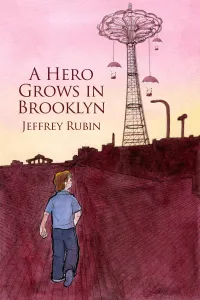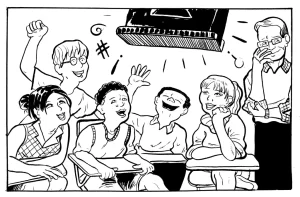
Respect and Tolerance
by Jeffrey Rubin, PhD
Welcome to From Insults to Respect.
As the title of this blog indicates, here we are interested in respect. The topic of respect is quite broad, and for a fairly complete coverage of its different definitions I recommend the Stanford Encyclopedia of Philosophy’s article on respect that can be retrieved for free HERE. The article covers not only the different meanings of the respect concept, it also delves into various relevant philosophical issues. However, for people who want to take practical steps to improve the respect others have for them, and their own self-respect, they will be disappointed. This blog’s posts aim to fill this gap.
 Improving one’s level of respect others have for us and one’s own self-respect matters intensely, for it shapes and structures our lives. And when individuals find they are unable to stomach themselves it profoundly diminishes the quality of their lives, and even for some, their desire to continue living.
Improving one’s level of respect others have for us and one’s own self-respect matters intensely, for it shapes and structures our lives. And when individuals find they are unable to stomach themselves it profoundly diminishes the quality of their lives, and even for some, their desire to continue living.
 There is a type of respect that is not the focus of this blog, the type one gets for being a doctor, a major leaguer, a Pulitzer Prize winner. People who actually get to personally know such individuals find that they display interpersonal actions that lead to either a deeper more longer lasting level of respect or disrespect. Similarly, they have intrapersonal skills that lead them to enhance their self-respect or end up tearing themselves apart. This blog is a seedbed for anyone seeking to grow their interpersonal and intrapersonal skills that enhance respect.
There is a type of respect that is not the focus of this blog, the type one gets for being a doctor, a major leaguer, a Pulitzer Prize winner. People who actually get to personally know such individuals find that they display interpersonal actions that lead to either a deeper more longer lasting level of respect or disrespect. Similarly, they have intrapersonal skills that lead them to enhance their self-respect or end up tearing themselves apart. This blog is a seedbed for anyone seeking to grow their interpersonal and intrapersonal skills that enhance respect.
 The posts you find here, along with my free novel, A Hero Grows In Brooklyn, about a boy growing up in Brooklyn struggling with issues related to respect, focus on suggestions that don’t cost even a penny. As someone who originally came from a family with meager financial resources, who, in my early life, lived with five family members in a tiny apartment above a hardware store with the elevated train roaring past our windows every few minutes along Brighton Beach Avenue, I feel a deep connection with those who can’t afford expensive private counseling or mindful self-compassion workshops, as helpful as these can be. Now that I’m retired I feel a great sense of satisfaction to be able to “give away” these ideas to folks regardless of financial circumstances.
The posts you find here, along with my free novel, A Hero Grows In Brooklyn, about a boy growing up in Brooklyn struggling with issues related to respect, focus on suggestions that don’t cost even a penny. As someone who originally came from a family with meager financial resources, who, in my early life, lived with five family members in a tiny apartment above a hardware store with the elevated train roaring past our windows every few minutes along Brighton Beach Avenue, I feel a deep connection with those who can’t afford expensive private counseling or mindful self-compassion workshops, as helpful as these can be. Now that I’m retired I feel a great sense of satisfaction to be able to “give away” these ideas to folks regardless of financial circumstances.
As an example, in one of the early posts I discuss the value of learning to tolerate criticism, and upon hearing it, to respond respectfully. There, I describe the following four levels of responding to negative criticism:
1. This level requires displaying one or more of the following:
2. This level requires displaying one or more of the following:
-
-
- Insults the criticizer (either with words, hand gestures, the sticking out of a tongue, the rolling of the eyes, or smirks)
- Glares at the criticizer
- Threatens the criticizer
- Punches, kicks, or throws an object without physically hurting someone or damaging anything
- Criticizes the criticizer without first fully addressing the original criticism.
-
3. This level requires displaying one or both of the following:
-
-
- Displays defensiveness without directly insulting the criticizer (raising voice’s volume or pitch)
- Displays a lack of interest either by verbally indicating this, or with nonverbal cues, or complete silence.
-
 4. Level 4 individuals listen to the criticizer in a supportive, warm, friendly style, and then make it clear that they fully understand what was said. Moreover, they put the criticizer at ease by making statements that indicate that the wise learn from criticism. Some time is spent on showing that they are thinking about the criticism. If, after thinking about the criticism the criticism is deemed to be correct, they make a statement frankly indicating, “I can see your ideas have merit and I intend to use them in the future.” If they are not sure if they agree, they make a statement indicating that they are very interested in what was said, plan to think a little more about this over the next few days and then they will be ready to discuss this further. If, after thinking about the criticism, the criticism is deemed to be incorrect, a statement is made designed to disagree without being disagreeable. More specifically, a sense of humor, some listening in a caring way and a few smiles help to traverse rough terrain. As the episode winds down, the criticizer is encouraged to feel comfortable communicating suggestions in the future.
4. Level 4 individuals listen to the criticizer in a supportive, warm, friendly style, and then make it clear that they fully understand what was said. Moreover, they put the criticizer at ease by making statements that indicate that the wise learn from criticism. Some time is spent on showing that they are thinking about the criticism. If, after thinking about the criticism the criticism is deemed to be correct, they make a statement frankly indicating, “I can see your ideas have merit and I intend to use them in the future.” If they are not sure if they agree, they make a statement indicating that they are very interested in what was said, plan to think a little more about this over the next few days and then they will be ready to discuss this further. If, after thinking about the criticism, the criticism is deemed to be incorrect, a statement is made designed to disagree without being disagreeable. More specifically, a sense of humor, some listening in a caring way and a few smiles help to traverse rough terrain. As the episode winds down, the criticizer is encouraged to feel comfortable communicating suggestions in the future.
 I then explain that in my research, individuals upon viewing video recordings depicting people responding to criticism with each of the four levels, rated those who displayed the highest level as more likable, respected, and mature then those responding to criticism at lower levels. In subsequent posts, I explain that to really improve one’s skill level in a manner that overcomes old entrenched habits most people must go through several practice lessons. These practice lessons also are cost-free and are described. Additional posts from time to time reinforce this set of skills. All of this training is available by going to the first post, and working through to each subsequent post.
I then explain that in my research, individuals upon viewing video recordings depicting people responding to criticism with each of the four levels, rated those who displayed the highest level as more likable, respected, and mature then those responding to criticism at lower levels. In subsequent posts, I explain that to really improve one’s skill level in a manner that overcomes old entrenched habits most people must go through several practice lessons. These practice lessons also are cost-free and are described. Additional posts from time to time reinforce this set of skills. All of this training is available by going to the first post, and working through to each subsequent post.
Today’s Topic
While thinking about what to write for today’s post, I happened to come upon an article in the American Psychologist by Bernd Simon about respect and tolerance. The article begins:
Mutual tolerance among all members of a society is vital for its functioning as a fair and stable system of cooperation (Rawls, 20005). This is true especially for plural societies, where people differ from each other in many ways and regularly disapprove of each other’s beliefs, practices, or ways of life.
 Upon reading this, it occurred to me that individuals who lack sufficient tolerance in their community are likely to stir up a great deal of anger, conflict, and disrespect toward a whole bunch of people. If you are okay about doing this, have at it. However, for those who would find that their lack of tolerance has been creating situations that fails to be fruitful, and therefore want to consider making some changes, the article led me to offer some suggestions.
Upon reading this, it occurred to me that individuals who lack sufficient tolerance in their community are likely to stir up a great deal of anger, conflict, and disrespect toward a whole bunch of people. If you are okay about doing this, have at it. However, for those who would find that their lack of tolerance has been creating situations that fails to be fruitful, and therefore want to consider making some changes, the article led me to offer some suggestions.
Practice over one month by taking two minutes daily to consider the value of respecting others who differ from yourself in many ways as understood as deserving equal rights, equal freedom, and equal concern. Respect for others as equals has the potential of restraining people’s disapproval of other’s beliefs, practices, or ways of life, without removing such disapproval, and thus make tolerance possible.
Now, for some, because of their minds flashing on many horrendous acts, they fling the whole tolerance concept right out the window. “Why should I consider being tolerant when such awful things as murder, rape, terrorism, and other illegal acts appear daily in our media! Am I supposed to be tolerant with all of this going on?!!!” But, the vast majority of our neighbors are reasonably law abiding. Consider what the cost would be to you if people who disapprove of your lifestyle were to be intolerant of you, and therefore, treated you disrespectfully. Might we be wise to treat others as we would have them treat us? Isn’t it better for us to treat law abiding citizens with respect, and they treat you equally respectfully?
 In Simon’s American Psychologist article, research is reviewed indicating that those who are tolerant of out-groups are more likely to be willing to engage in intergroup cooperation and have higher levels of well-being. Additionally, when people in the out-group are treated with respect, they are more likely to reciprocate and respond in kind. This expression of respect for others is thus reflected back leading to an increase in the tolerant person’s own self-respect.
In Simon’s American Psychologist article, research is reviewed indicating that those who are tolerant of out-groups are more likely to be willing to engage in intergroup cooperation and have higher levels of well-being. Additionally, when people in the out-group are treated with respect, they are more likely to reciprocate and respond in kind. This expression of respect for others is thus reflected back leading to an increase in the tolerant person’s own self-respect.
So, there you have it, some thoughts about respect and tolerance, along with a little technique to enhance the reader’s tolerance. I hope you give this some thought because I’m thinking living in a world where more people are tolerant and respectful would be good for us all.
My Best,
Jeff
——————-
Some people will enjoy reading this blog by beginning with the first post and then moving forward to the next more recent one; then to the next one; and so on. This permits readers to catch up on some ideas that were presented earlier and to move through all of the ideas in a systematic fashion to develop their emotional and social intelligence. To begin at the very first post you can click HERE.





Write Your Comment